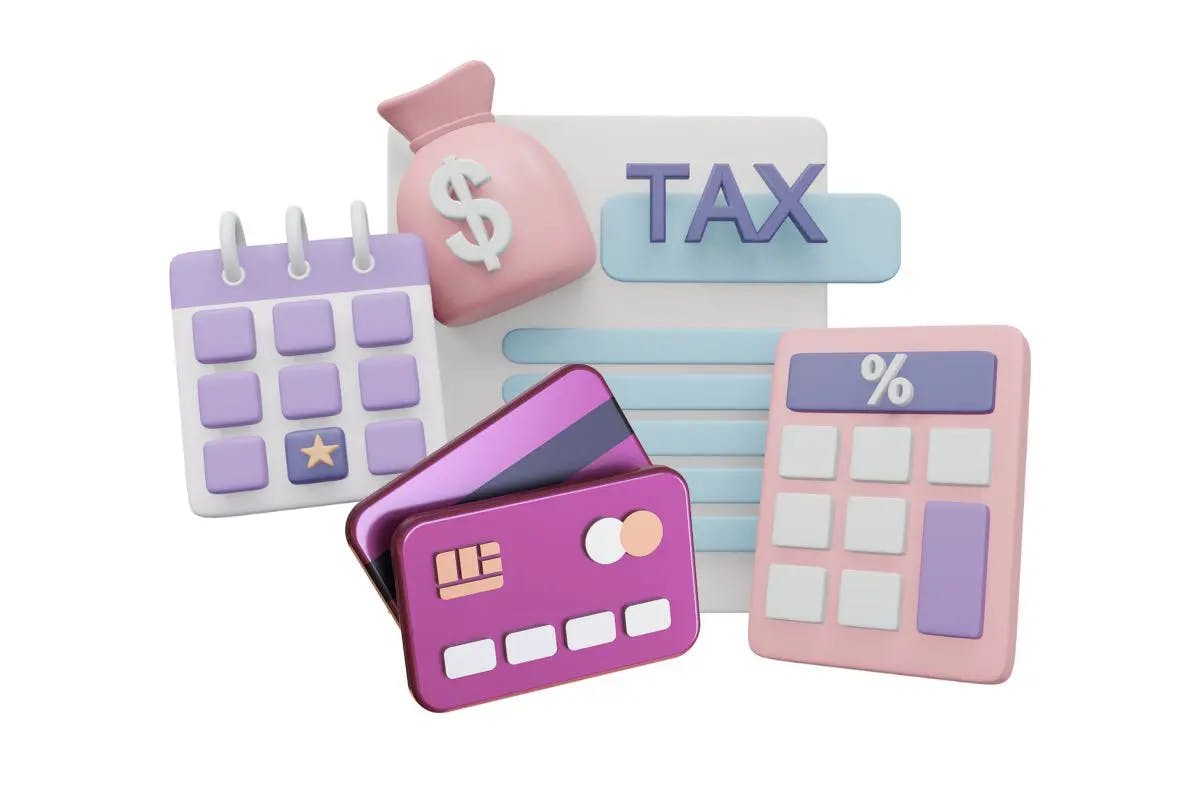Can You Pay Taxes With a Credit Card?
By Jonathan Lipson | Published on 27 Nov 2022

Can you pay taxes with a credit card? What a tempting thought! Income tax time is not the most wonderful time of the year. Unless, of course, you’re expecting a refund, then ‘tis the season to be jolly. But, for the rest of us, the Canada Revenue Agency (CRA) wants your money, and they want it sooner rather than later.
If you owe money, your Notice of Assessment (NOA) will indicate that you can avoid additional interest charges if you pay your tax bill by a specific date. But what if you don’t have enough cash on hand? Luckily, you can pay your taxes with a credit card and a few other methods too. Here’s what to know
You owe income tax, now what?

Once you file your income tax return and it gets processed, the CRA will advise whether you can expect a refund or if you have a balance owing. If you do not pay the balance by the due date, CRA will start charging you compound daily interest as per their prescribed interest rates. For overdue taxes, the interest rate was recently increased from 5% to 6%.
Let’s think about that for a minute. When you get a tax refund, it means the government collected too much money and they owe a chunk of change back. Essentially, you gave the government a loan and can’t charge them interest on it. But if you owe them money and fail to pay on time, usually by April 30th, they start charging you interest and it’s not cheap.
Ways to pay your taxes
For some folks, paying their income tax balance in full by the CRA’s deadline may not be possible. In that case, a phone call to them to discuss a payment arrangement may be required. The CRA also has a Payment Arrangement Calculator for those who want to calculate different payment arrangements before calling the CRA. For other folks, there is also the decision of how to make a payment. Luckily, there are several options to choose from. You can pay:
• In-person with your remittance voucher at your Canadian financial institution or, for a fee, at your local Canada Post office
•Using a cheque or money order by mail
• Online or by phone using a Canadian financial institution’s services (BMO, CIBC, etc.)
• At canada.ca/cra-my-payment (they accept Interac Debit, Visa Debit, or Debit Mastercard)
•With a pre-authorized debit agreement at canada.ca/my-cra-account
• Via internet with your credit card via a third-party service provider (Plastiq or PaySimply)
In-person
The quickest method is through your own bank. Payments made in person are considered paid as of the date stamped by your financial institution.
By Mail
Payments made by mail are considered paid once received by CRA. This could take up to ten business days for the CRA to receive and record your payment.
Online
Payments made online may take up to three business days to process. Ideally, it would help if you have your CRA My Account set up online. Then you would have instant access to your income tax information slips, Notice of Assessment (NOA), benefits and credits details,
correspondence, etc. You can also confirm that your payment has been received and processed.
How to pay taxes with a credit card or with a debit
Paying taxes with a credit card online means your transaction is quick, secure, and convenient. For many, convenience is one of the main reasons people may choose to use their credit card to pay the CRA. You don’t have to leave your home to make a payment and you have a record online that your payment was posted and processed in a timely manner.
Debit-credit cards
If you want to pay taxes with your Visa-Debit card, participating Canadian financial institutions include, but are not limited to:
- CIBC
- RBC
- Scotiabank
- TD
- ATB
For Debit-Mastercard, participating Canadian financial institutions include, but are not limited to:
- BMO
- Servus Credit Union
These bank access cards, commonly called debit cards, have a number and a CVV code similar to a credit card. However, they are linked to your bank account. As a result, the funds are withdrawn from your own bank account when your payment is made online, rather than incurring a balance owed to a credit card company.
Regular credit cards
To pay your taxes with a credit card, the CRA authorizes the following third-party service providers:
Plastiq
Plastiq accepts debit cards and all credit cards, including Visa, Mastercard, and American Express. Their service fee is 2.49%, and they advertise that they are the lowest-fee credit card payment provider to the CRA. You can pay several types of taxes on their website, including T1 personal tax, excise tax, GST/HST, Air Traveller’s Security Charge, and more.

PaySimply
PaySimply offers more choices by accepting debit cards, credit cards (Visa, Mastercard, and American Express), Union Pay, PayPal, and Interac eTransfer. Their service charges range from 1.0% for eTransfers, to 2.5% for credit cards, Union Pay, and PayPal. They also charge fees ranging from $3.95 to $7.95 for people who wish to pay with cash or debit at a Canada Post location.

Why pay taxes with a credit card?
Both Plastiq and PaySimply offer you convenience through an easy and secure method to pay taxes without signing up or creating an account. In return for this convenience, they both charge a service fee. The service fee may not deter you if you prefer to pay using your credit card or by any other method these two companies offer. Other reasons to pay taxes with a credit card may include:
To avoid late payment interest penalties

If you use these companies to pay your balance owing before deadline, you avoid additional interest charges. You also avoid interest charges from your credit card company if you pay your credit card balance in full before the payment due date on your monthly statement.
That would be an important factor to consider in using your credit card to make a payment. Avoiding the additional interest charged by CRA would be in vain if you maintain a high balance on your credit card long term and end up paying even more interest to your credit card company instead.
Still, very often your credit card company will charge less interest than the CRA will. For many, it makes sense to choose whichever option charges the least amount of interest.
In addition to convenience, the appeal of using a credit card to pay CRA may be the perks that come with your credit card.
To collect points and rewards

If you’re someone who likes to hack credit card features like rewards, cash back, or travel points, you know exactly what I mean by “perks.” You probably already know “that person” who charges absolutely everything to their credit card, whether it’s a $2 coffee on the way to work or a $2,000 sectional couch for their living room.
For them, it’s all about the accumulated points, miles, or rebates. Some people are highly strategic in how they use their credit cards and get a thrill from making the credit card companies pay them! Read more about 10 Ways to Make Money With a Credit Card.
Cash back credit cards
Cash back credit cards are great if you want to make money every time you use the card. These cards give you a small percentage rebate on all your purchases that you can apply to your credit card balance, or cash out to your personal bank account.
Reward points credit cards
Reward points are appealing if you enjoy getting free stuff. Credit Cards with reward point programs allow you to redeem them for things like travel, gift cards, merchandise, concert tickets, and more.
Travel perks with credit cards
Frequent flyer miles and other travel reward programs are attractive if you like to globetrot. Travel credit cards let you redeem points for things like flights, hotels, tourist attractions, rental cars, and other travel-related expenses.
Other perks of using your credit card to pay taxes
Some credit cards also offer bonus points or miles if you use your credit card at a particular store or purchase an item that may earn bonus miles or points that week.
Other perks include credit card insurance for things like travel and items purchased on the card. For example, extra coverage on your car insurance when renting a car or an extension on the warranty of an electronic device, appliance, and other big-ticket items that you purchased.
Cons of paying taxes with a credit card
If you are going to use your credit card to pay taxes, there are some caveats to this practice. Be mindful of fees and interest charges, and use your credit card responsibly to avoid getting yourself into debt.
Rates and fees
First, typically, there is an annual fee to use some of these rewards credit cards. If your card has an annual fee, make sure you’re getting more value than the fee you’re paying. This is exactly why some people carefully gamify the use of their credit cards so that the reward outweighs the fee.
Secondly, credit card charges should be for needs rather than wants. In other words, don’t charge something you don’t need or won’t really use just to gain points, miles, or cash back.
Risk of overspending
This can also lead to overspending, and your credit card balance may creep up to the point that you cannot pay your entire balance before the payment due date. It is challenging since the credit card company or your reward program encourage you to use your credit card more often to gain double or bonus points, rewards, or cash back.
Credit card companies and reward programs frequently offer promotions to motivate you to use your credit card. This is something to keep in mind so that you use your credit card responsibly.
Paying taxes with a credit card can make life easier
People who owe taxes to the CRA may automatically pay using online banking by setting up CRA as a bill payment payee, not realizing that CRA does accept credit cards. For those who prefer to use a credit card for most, if not all, of their purchases or charges, paying taxes with a credit card would be ideal.
It’s quick, easy, secure, and convenient. And those points, miles, and rebates contribute to your personal goals or wish list. Are you planning a trip? Saving up for a big purchase? You’ll eventually redeem your points for that special something you’ve been saving for over the past few months or years. It’s a win-win situation!
